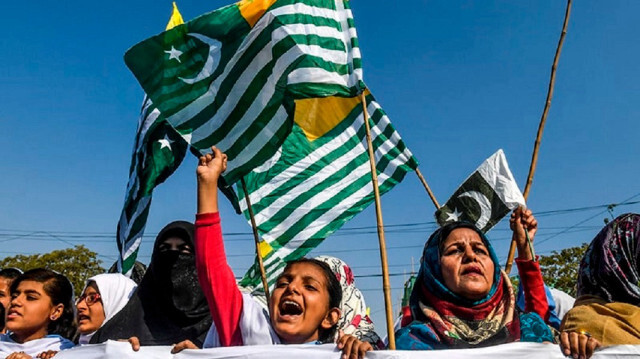
India has learned nothing from history and its unsuccessful attempts over the last seventy-five years to suppress the Kashmiri spirit and desire for freedom. Successive generations of Kashmiris continue to demand their right to self-determination despite facing brutal repression
More than 75 years after it occupied Jammu and Kashmir, India remains unable to crush the Kashmiris’ indomitable spirit. With most of the Kashmir leadership either in jail or under house arrest, the Kashmiri people’s struggle for freedom and self-determination still continues, confounding the Indian government and its 900,000-strong occupation force.
While this is a tribute to the courage and determination of the Kashmiri people, it should be a moment of self-reflection for the international community.
How is it that the Jammu and Kashmir dispute – the oldest item on the United Nations’ agenda and a proven flashpoint between two nuclear-armed countries – is no closer to resolution? Why is it that despite a slew of UN Security Council Resolutions recognizing the Kashmiris’ right to choose their own destiny, they are still awaiting the opportunity to exercise self-determination? How can we continue to speak of an international rules-based order when one country can so brazenly thumb its nose at international law and norms?
The Kashmir dispute is a “test” for the United Nations because it was the UN that had guaranteed the Kashmiris’ right to self-determination 74 years ago. Yet more Kashmiris are being killed in staged encounters blinded by pellet-firing shotguns and facing enforced disappearances in the middle of the night.
On August 5, 2019, India gave up even the pretense of any respect for international law by unilaterally annexing the disputed territory. These measures were neither consistent with the United Nations resolutions nor held any legal standing.
Since then, Kashmir has entered an even darker, more repressive phase. Over 740 Kashmiris have died – more than 200 in 2022 alone. This after India imposed the world’s longest Internet shutdown on the region’s 12 million inhabitants. Kashmiri leadership and human rights defenders are in prison while the Kashmiri media has been completely silenced.
Meanwhile, India has begun to settle its non-Kashmiris in the disputed territory, in flagrant violation of the Fourth Geneva Convention. This is 21st century-style “settler colonialism” in action. There are now signs that India is preparing grounds for holding sham elections in the occupied territory. A farcical delimitation exercise has already been carried out to underrepresent Kashmiri Muslims who make up a large majority of the population.
India has also added 700,000 non-residents to the electoral rolls – a thinly disguised attempt at turning the Kashmiri Muslims into a minority in their own land. In simple terms, India is effecting demographic changes in violation of the Fourth Geneva Convention that interdicts the occupying power from taking such measures.
These measures are part of a concerted strategy of the ruling political party in India that wishes to remake India into a Hindu Rashtra, which would have no place for Muslims, Christians, Sikhs, and even lower-caste Hindus. What is surprising – and disappointing – is the silence of the international community on India’s oppression in Kashmir and its provocations against its neighbors.
Yet India harbors pretensions to be a great power. Indeed, it has champions who want to make India into a great power and look the other way when India makes a mockery of the very values that they espouse.
India has learned nothing from history and its unsuccessful attempts over the last seventy-five years to suppress the Kashmiri spirit and desire for freedom. Successive generations of Kashmiris continue to demand their right to self-determination despite facing brutal repression.
The people of South Asia, one of the poorest regions in the world, yearn for peace, prosperity, and a better future for their children. They should not be held hostage to one country’s refusal to face an unalterable reality: there can be no peace in South Asia without the peaceful settlement of the Jammu and Kashmir dispute.
For its part, Pakistan will continue to stand with Kashmiris. We will continue to extend all political, diplomatic, and moral support to the brave sons and daughters of Kashmir who continue to defy the world’s largest occupying force in the world’s most militarized region. We will also continue to strive for peace, which will only come when the Kashmiri people are able to determine their own fate. It is a tragedy that Pakistan does not have a partner for peace across the border.

